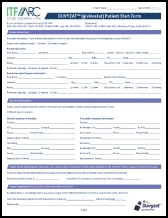DUVYZAT resources for you and your practice
Sample Medical Necessity Letter
A sample letter that highlights information that the patient's insurance plan may require to authorize coverage of DUZYZAT.
Sample Medical Appeal Letter
A sample letter that highlights information that a patient's insurance plan may require to reconsider coverage of DUVYZAT.

ITF ARC Patient Services Brochure
A quick reference guide for how ITF ARC can help your patients access and stay on treatment with DUVYZAT.

Patient Monitoring Tool
A quick reference guide for monitoring your patient's first year of treatment with DUVYZAT.
Frequently asked questions about DUVYZAT
Here are some frequently asked questions to help answer any questions you may have about DUVYZAT.
When was DUVYZAT approved in the United States?


DUVYZAT was approved by the US Food and Drug Administration on March 21, 2024.
Who is eligible for treatment with DUVYZAT?


DUVYZAT is indicated for all patients with DMD 6 years of age and older, regardless of genetic mutation or ambulatory status.1,* *The EPIDYS clinical trial did not include nonambulatory patients.
Does ITF offer a free drug program for DUVYZAT?


We are committed to making treatment with DUVYZAT available to as many appropriate patients in the US as possible by working with payers to enable access. We also offer a variety of programs to help patients access treatment while insurers complete their assessments. These include:
- A copay assistance program for commercially insured patients, where patients may pay as little as $0
- A temporary supply program that provides a limited supply of DUVYZAT to help ensure a timely start for appropriate patients facing insurance-related delays
- A temporary supply program for patients currently on therapy who may be changing insurance providers and might otherwise experience a gap in treatment
- A patient assistance program providing DUVYZAT at no charge for eligible patients, based on established criteria
What options are available to patients who are unable to afford DUVYZAT?


We understand that patients may encounter out-of-pocket costs in situations where insurance coverage is insufficient. As a reflection of our commitment to making treatment with DUVYZAT available to as many appropriate patients in the US as possible, we have created a suite of programs to help address potential financial concerns, including:
- A copay assistance program for commercially insured patients, where patients may pay as little as $0
- A temporary supply program that provides a limited supply of DUVYZAT to help ensure a timely start for appropriate patients facing insurance-related delays
- A temporary supply program for patients currently on therapy who may be changing insurance providers and might otherwise experience a gap in treatment
- A patient assistance program providing DUVYZAT at no charge for eligible patients, based on established criteria
Will DUVYZAT be available for patients with Becker muscular dystrophy?


DUVYZAT is a histone deacetylase inhibitor indicated for the treatment of Duchenne muscular dystrophy in patients 6 years of age and older in the US.1 DUVYZAT is not approved for patients with Becker muscular dystrophy (BMD). We recognize the significant unmet medical needs of people living with BMD and their families. Our program for BMD is in the early stages of clinical development. It is important to note that this question pertains to an unapproved or uncleared use of DUVYZAT. For further details, please contact Medical Information at medinfo@itftherapeutics.com.
Who is ITF Therapeutics?


ITF Therapeutics is the US-based rare disease division of Italfarmaco S.p.A. Founded in 1938 in Milan, Italy, Italfarmaco is a private global pharmaceutical company that has led the successful development of many innovative therapeutic products approved for use by patients around the world. The company operates in more than 90 countries on 5 continents and continues to advance promising research to address unmet medical needs in a wide range of therapeutic areas. In January 2024, Italfarmaco launched ITF Therapeutics as a new division in the United States with a focus on the development and commercialization of products to treat rare diseases, including Duchenne muscular dystrophy (DMD). Building on a legacy grounded in collaboration and innovation, ITF Therapeutics strives to partner with leaders from the US patient advocacy and treatment communities to ensure that our programs reflect and support their unique needs and goals. The establishment of ITF Therapeutics also reflects Italfarmaco's goal to build a world-class team of experts who share a passion to make a positive impact for rare disease communities. For more information about ITF Therapeutics, please visit itftherapeutics.com.
Reference: 1. DUVYZAT. Prescribing information. lTF Therapeutics; 2024.



